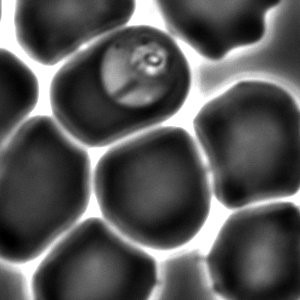
Protein export by the malaria parasite
According to the World Health Organization, there are approximately half a million malaria related deaths annually. Symptoms of malaria are seen when the malaria parasite resides and replicates inside human erythrocytes. Within the erythrocyte, the parasite exports many proteins across its own plasma membrane and a surrounding vacuole membrane, into its host cell. These proteins play key roles in modification of the host cell, which is essential for parasite survival, and also important in the pathology of the disease. The major research interests of the lab include elucidating the molecular mechanism of protein export and understanding the molecular basis of how the parasite modifies its hosts erythrocyte cells.

Selected publications
Expansion of Lysine-rich Repeats in Plasmodium Proteins Generates Novel Localization Sequences that Target the Periphery of the Host Erythrocyte
Davies, H.M., Thalassinos, K., Osborne, A.R.
Journal of Biological Chemistry (2016) 291 (50):26188-26207
The C-terminal portion of the cleaved HT motif is necessary and sufficient to mediate export of proteins from the malaria parasite into its host cell
Tarr, S.J., Cryar, A., Thalassinos, K., Haldar, K., Osborne, A.R.
Molecular Microbiology (2013) 87(4):835-850
A conserved domain targets exported PHISTb family proteins to the periphery of Plasmodium infected erythrocytes
Tarr, S.J., Moon, R.W., Hardege, I., Osborne, A.R.
Molecular and Biochemical Parasitology (2014) 196(1):29-40

